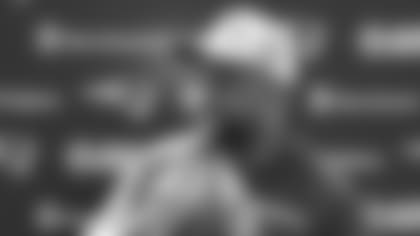BB: As I said yesterday on the conference call, we've been looking at Buffalo, they've been very impressive here their first couple of games but also through preseason and really the second half of the season last year. I think Chan [Gailey] and his staff have done a great job. They're playing very well, they have a lot of good football players and they're doing things well in all three phases of the game. It's always tough with Buffalo. We have a lot of work to do. There are a lot of things to prepare for - they have a lot of good players. This will be a big week for us - another division game on the road so this will be a big challenge up there.
Q: You have game planned for Shawne Merriman at least three times now. Is he the same player that he was?
BB: You know, I think he's a guy you definitely have to do a good job on. Look at the Chicago game, he had three sacks in four or five plays, just one right after another - they couldn't block him. He's an explosive guy, very powerful, runs well, makes a lot of plays on the backside, on the chase, as well as at the point of attack where he's a strong, hard guy to move. He's a good, strong, power pass rusher that can get the edge and come inside, that can run guys over and run around them. He's done a good job for them - I think it's a good addition.
Q: Sticking with guys you have familiarity with, how have they been using Brad Smith to this point?
BB: They use him a lot. They use him in the kicking game, they use him offensively, he's played receiver, he's played in the backfield [and] he's played the wildcat spot. It looks like they definitely have a good package for him. They've used him on a lot of their regular plays and other plays that I'm sure are just special plays for him. You certainly have to be ready for him on special teams.
Q: How has Brian Waters done the first two weeks of the season? From the outside, it appears his assimilation has been pretty seamless.
BB: Brian has been very professional. He's come in here, he's really worked hard, learned all the things that he can in this time about our offensive system and communication and process of calling plays and changing them and so forth. Like I said the other day, every time I go by his locker or go by him in the cafeteria, he has a book open, studying his game plan, studying his notebook, very professional, watched a lot of film. I've really been impressed with not only the way he's performed, but just the way he's gone about his job. I think again, the level of experience and professionalism that he brings to the team, you can see why he has played in the league as long as he has at such a high level. He really works at it. He adds a lot of - not in an outspoken way - but he adds a lot of quiet leadership and professionalism to our football team. I've really been impressed with him.
Q: How unique is it to have a player with his experience to be able to come in seamlessly?
BB: I don't know that it has been seamless. I think he's worked very hard at it. Like I said, I think the number of hours and the amount of extra work after everybody is gone or before they get here, that he does, has been significant. A lot of the credit goes to him, also Dante [Scarnecchia] of course, and his teammates. He works well with them. You have to as an offensive lineman, you have to know what everyone else is doing, they have to know what you're doing, you have to communicate that as a group of five and all perform really as one - one unit that sees everything the same way and that's not easy to accomplish. Certainly I think what he has done is a big credit to him but also to all the other people working with him.
Q: Ryan Fitzpatrick has really ascended quickly over the last year. Why is he so successful with that offense?
BB: We saw it in the first game here last year. He's smart, he sees defenses well, he reads coverages, gets rid of the ball quickly, he's got good skill players to work with - he's got a good offensive team, it's certainly not all him. He's done a good job of managing it and executing it and he's made a lot of good throws. He's an athletic guy. He can escape and run out of some pressures. But the biggest thing for any quarterback is accuracy and decision making and he's done a real good job of that.
Q: When you're rotating linebackers, like Brandon Spikes and Dane Fletcher, what do you get from Spikes that you don't get from Fletcher and vice versa?
BB: I don't think it's really a question of that. It's just a question of utilizing your personnel and within each game plan having roles or having packages, if you will, groups of defensive players, however you want to set it up, that each person can really concentrate on. Not that they're not responsible for all of them, not that we don't do different things with them, but I think all those players can do the things they're asked to do but sometimes, for various reasons, game plan or just breaking up the duties a little bit, especially when guys have significant special teams responsibilities like Dane does, trying to manage the overall number of snaps and responsibilities that a player has during the week. You just don't want to pile it all on one guy. I'm not saying that they can't handle it, but sometimes when you have the opportunity to spread it out a little bit, that can be productive for the team too. I don't think it's a case of 'who can't do this?' and 'who can't do that?' I think it's more of just managing your resources.
Q: Are you anticipating any moves on the 53-man roster as you juggle with some health concerns?
BB: Yeah, we probably will. Before the end of the day we'll probably have something for you.
Q: Can you give us a hint?
BB: I want to keep you guessing. It makes for good copy, right - the best story, get all the inside information.
Q: What makes Fred Jackson the kind of running back he is? He's putting up big numbers.
BB: He's been doing it his whole career. There's really no weak points with that guy, he does everything well. [He] runs hard, breaks tackles, good vision, good balance, catches the ball well, outstanding as a blocker, exceptional, blitz pickup, even when they ask him to run block which occasionally they do with their different personnel groupings. He's good at everything. We know he can return, we know he can play in the kicking game - it's just a question of what they ask him to do. He's really outstanding. He's one of the best backs in the league. I would say no weak points. I don't know what the weak points would be.
Q: I heard they may use C.J. Spiller at wide receiver because of injuries at the position. How much have they put him out there?
BB: They use a lot of empty formation where there's nobody in the backfield besides the quarterback so everybody has been out there, whoever is in there. It's always a matchup problem. Defensively how you're going to handle it, what your adjustments are going to be, it depends on what you have called and whether you want to adjust what you have called or whether you want to get into something else. Where are they and who are they, because they do it out of a lot of different personnel groups - it's hard, you don't know exactly whose going to be in there - one tight end, two tight ends, no tight ends, one back, two backs, Brad Smith - so they mix it up a lot of different ways. We have to deal with all of the players out of the backfield - the running backs, the tight ends attached to the formation, the receivers lined up at different positions, when they go to empty or anything in between.
Q: Will you treat him differently if he just lines up as a receiver as opposed to how you would treat him if he motioned out of the backfield?
BB: It depends on what our rules are. It depends on what we have called. Different defenses, they don't always have exactly the same rule in that. It would depend on what our rule is for that particular call. Anytime a player plays multiple positions, whether it's a tight end that plays inside, outside and in the backfield or it's a back that plays in and out of the backfield or receivers that move around then you have to have some way to deal with that. It's just another thing you have to adjust to. I'm sure they're looking for certain plays and certain mismatches with him. But they're doing that with everybody else too. It's him and you have [David] Nelson, you have [Scott] Chandler, you have [Steve] Johnson, you have all the rest of them, Brad Smith, it's not just one guy, it depends on who else is on the field - how you want to handle those guys too.
Q: Have they changed much defensively from a schematic standpoint?
BB: No, I wouldn't say they've made major changes. I think the biggest change really is the personnel - some of the personnel on the front and at linebacker with [Marcell] Dareus, [Shawne] Merriman, [Nick] Barnett, and those guys. We didn't see them last year, but they're all significant players. A lot of the guys that we've seen before, Kyle Williams and [Chris] Kelsay, guys like that, they've been a problem, they're still a problem.
Q: Have you seen some signs from Dave Wannstedt? Any changes with his fingerprints on them?
BB: It's hard to tell. Somebody who is there with them on a daily basis or something maybe could tell you about that, I just know what we see. They do a lot of things they did last year, they're doing some new things - whether that's Dave, whether that's Chan [Gailey], whether it's… I don't know.
Q: When it comes to building depth, do you have a number in mind at the start of the season of how many players you'll need over the course of the season because of the number of injuries that crop up over the course of the year?
BB: No, I don't think so. But I think historically if you look at it, you probably would take your practice squad players, take those eight players and over the course of the year, eventually those eight players will be on your roster. Or if it isn't one of them, it will be somebody, a veteran player that isn't practice squad eligible that will replace somebody on your roster. So I think that's the ball park number. Even though you cut your team to 53, you're really cutting it to 61 when you add the practice squad. I'd say by the end of the year, you're probably going to get to those 60 players or if not, depending on what your needs are, if you have guys on the practice squad that can move up, it might be them. If you don't have somebody on the practice squad or if there's a better veteran that's available that's not practice squad eligible, he could be an injury replacement during the year. It's a round number but again, you get multiple injuries at the same position, nobody has enough players to stockpile that. I would say that would be the ballpark number. So I really look at it, when we reduce the roster to 61 at the end of training camp, that's really our football team. It's 53 but it's really 61 because as you know you can take a guy the day before the game and put him from the practice squad to the roster and he could dress and he could play in a game. And so could everybody else, so those guys really, they aren't on your team, but they are on your team. Or they are on your team but they're not on your team, however you want to look at it.
Q: How is Kevin Faulk doing in his rehab?
BB: Good.
Q: What's it like to have him around?
BB: He's great to have around. There's nobody better than Kevin. He's got a wealth of experience, got a great attitude, great work ethic, does everything he can do personally and then does what he can do to help, not just younger players but any players. He's a great teammate. I don't think there's anybody more respected in this organization than Kevin Faulk. He's been a great competitor, great player and his attitude, work ethic and really role on the team are just exemplary. If you told any player, if you could be like Kevin Faulk, we'd all be thrilled to coach as many of those Kevin Faulks as we could get. He's awesome.
Q: With Mike Wright having the concussion and after what he went through last year, is this a situation that goes beyond whether he can be back this year or are you looking at the concussions piling up and threatening his career?
BB: Well that's something that goes through our medical department. I think Mike is getting good care. I think Mike, I talked to Mike about it and Mike has obviously talked to our medical people. I think there's a good understanding of what the situation is and how it changes or when it changes, this year relative to last year to other years, those are medical decisions.
Q: Third down conversions were a struggle last week - I think San Diego was 10 of 12 and it was similar in Miami. Why the struggle on third down?
BB: What was similar to Miami?
Q: Just keeping them from getting a first down.
BB: Miami converted two third downs. I'm just not following you.
Q: Okay against San Diego then.
BB: We didn't do a good job getting off the field when we had opportunities to, no question. We were saved by some turnovers. We didn't do a good job on third down against San Diego. They converted a lot of them. I felt like there were some plays we could have made there but we didn't make them. Miami, we made most of them. I don't know, maybe you saw it differently, but that's what it looked like to me.









































